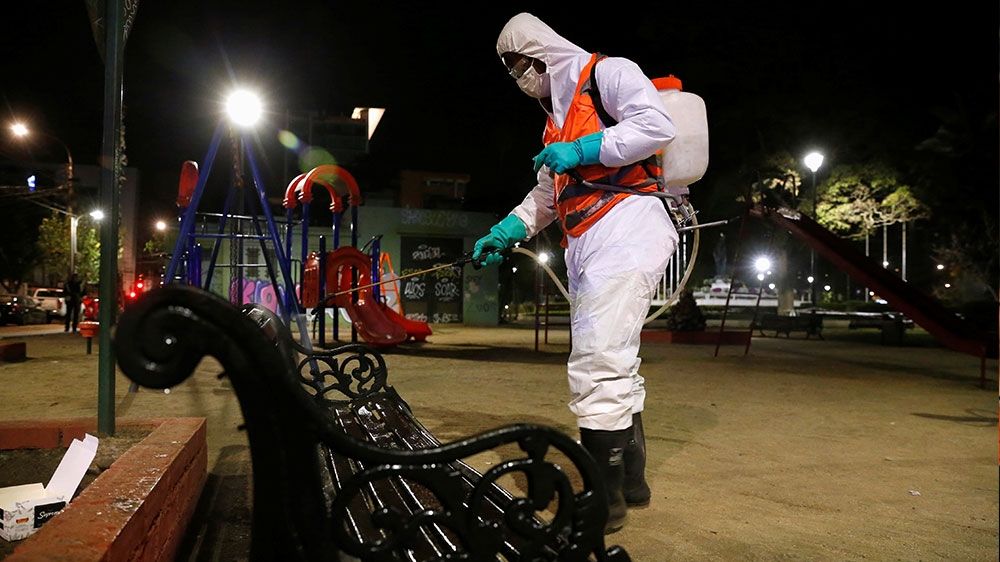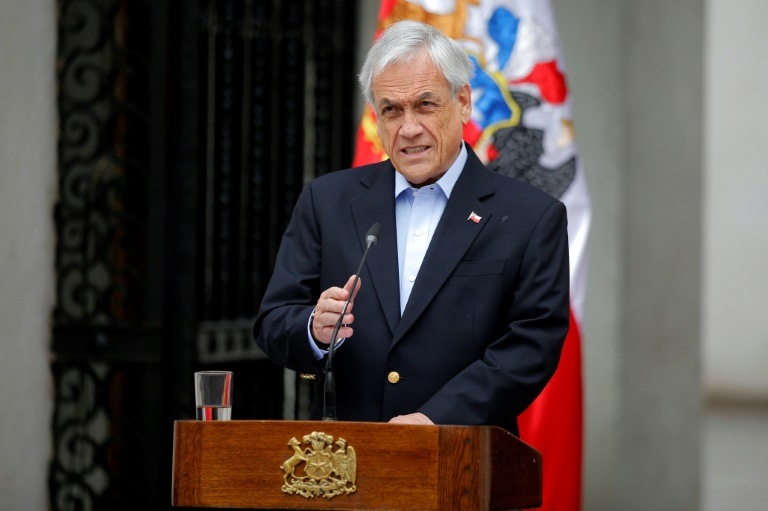RIO DE JANEIRO, BRAZIL – The coronavirus pandemic is affecting Chile at a politically sensitive moment. Never before in the history of the country has a President and his government had such a low level of popular support. Until a month ago, the approval rate stood at around six percent.
Until early March this year, millions of people took part in the protests against the country’s neoliberal economic system, which began in October last year.

Now the coronavirus pandemic has stopped the protests, the daily gathering of demonstrators at Plaza Dignidad and many other public protest actions throughout the country.
But they are by no means over. The coronavirus crisis could even further intensify the social conflicts in the country.
Since October 2019, Chileans have been protesting against the neoliberal economic system introduced under the military dictatorship of Augusto Pinochet, which has deepened since the transition to democracy in the 1990s.
One of the most severe consequences is the strong income and wealth inequality. This in turn is aggravated by the privatization of health, education and pension systems, among other things, which not only reproduces classes in these areas, but also widens the gap between them.
While a small elite can afford to pay benefits that exceed European standards, others are forced to run up high debts for poor services. Access to good health care depends largely on the income of those affected. However, not only is the quality not guaranteed, but also access itself.
About 26,000 patients die every year in Chile while on waiting lists for a hospital bed.
The neoliberal structure of the Chile’s economy, politics and state, is anchored in the Chilean constitution, which dates back to the time of the dictatorship. A central concern of the protest movement was thus to fight for a constituent assembly.
The massive movement on the streets last year succeeded in forcing an agreement between government and opposition to hold a referendum on the initiation of a constitutional process. This should have taken place in April but has now been deferred to October, without much opposition as a result of the virus.
President Sebastián Piñera in particular came under growing criticism during the protests. He stands like no other for the neo-liberal alignment of the Chilean political and economic elite. His family emigrated to the USA in his early years, where he later studied economics at Harvard University.
Returning to Chile, he introduced the credit card system in the country and turned it into a billion-dollar business. Today he is one of the wealthiest Chileans and is ranked 859th worldwide by Forbes.
In many countries, the coronavirus crisis has led to an increase in government approval ratings. At least for a short time, the states seem to be able to act again and, with the approval of their citizens, to intervene strongly in people’s lives.
All around the world, it suddenly seems that national shoulder-to-shoulder cooperation between all political factions is now possible to act jointly for the “common good”. On the surface, this seemed to be the case in Chile at first.

On March 18th, five months after the October Rebellion, President Piñera proclaimed the “state of emergency” and, as before, sent the military to the streets to enforce curfews.
However, unlike October, this time the streets of Chile remain quiet. According to some controversial surveys, the coronavirus pandemic raised the President’s approval rating to 21 percent within three weeks.
Yet even if the streets are empty for the time being and Piñera provocatively tweeted a photo of himself in Plaza Dignidad, the symbol of the protest movement, the Chilean struggle is not yet over; it has merely shifted to other areas for the time being.
The pandemic could even lead to an escalation of the situation, as the health system crisis, private social security systems, precarious employment and social inequality are now dramatically worsening.
The reason behind this is partly due to the structure of the state, which was converted into an “anti-social state” during the dictatorship. Chilean social scientists call it the “Estado subsidiario” (subsidiary state), which surrenders all areas of the economy and life to the market wherever possible and only intervenes where the market fails.
According to Emmanuel Farías Carrión and Juan José Moreno Figueras, social rights thus become consumer goods that must be paid for. This has not only led to the widely criticized and considerable inequality in Chile, but also to the fact that the state is hardly able to act in times of crisis such as the current one.
The origin of the spread of the coronavirus in Chile and the current quarantine situation reflect the country’s inequality. As in many other countries, the virus was first introduced by rather wealthy “cosmopolitan” jet-setters.
Despite the large class gap, the virus quickly spread to the rest of the population, largely through domestic workers who have to travel for hours on crowded public transport before and after work, making it almost impossible to avoid contagion of others.
After Health Minister Mañalich initially ruled out a curfew several times and made international headlines with his hope for a mutation of the virus that would perhaps in the long term yield positive results, he finally imposed a “total quarantine” on selected communities in Santiago.
As a result, the wealthy neighborhoods are sealed off and under curfew, while the rest of Chileans are still forced to go to work and continue to travel on completely crowded public transports.
Remaining at home is a luxury that the many casual workers, small business owners and many formal employees cannot afford. Temuco, one of the poorest communities in Chile, is now the one with the highest number of cases.
President Piñera initially reacted without direction and only took initial measures to stop the spread of the virus at a late stage. Although these were unsuitable from a viral perspective, they were all the more effective from a repressive standpoint: after March had begun with the largest protests since the uprisings began in October – over two million people demonstrated on March 8th – the streets in Chile are now quiet again.
Under the “state of emergency” proclaimed on March 18th, the military is to enforce evening and night curfews.
In the meantime, a package of measures has been adopted, which includes economic assistance from the government for employees and businesses.
Thus, Piñera announced special measures to protect employers, rather than workers as in most other countries, from economic losses. Among other things, companies are allowed to dismiss their employees without notice or not pay their wages if they cannot come to work because of the current situation.
Employees would then be able to claim unemployment insurance; in addition, short-time work would be possible, with the government subsidizing wages. However, this is only aimed at formally employed wage earners, but 30 percent of the workforce is casual. They can only receive a one-time payment of 50,000 pesos (US$ 60).
Many Chileans quickly realized who would bear the costs of the pandemic and who would soon be affected the most. In the current situation, there is still sufficient capacity for intensive care patients with lung disorders, but mainly in private clinics.

However, this is not the only problem: while the government is tightening its hygiene regulations for washing hands, 350,000 citizens have to live without running water, according to Greenpeace, and therefore do not have the means to comply with these regulations.
In addition, the significance of the demands made in recent months with regard to the health system has now become clear: since mid-October, people have been demanding, among other things, a better health system, and the nursing staff and doctors have been demanding better working conditions for years.
The government’s disregard for these demands now illustrates the consequences: In a survey conducted by the Medical College between March 26th and 30th, almost 90 percent of health workers complained that there was already far too little protective equipment for medical staff. In addition, the number of people infected is constantly increasing. In a clinic in Santiago, almost 70 workers had to undergo quarantine at once in early April.
Such developments increase the shortage of staff even further. Hospitals that were already overcrowded before the coronavirus pandemic are currently developing into hotbeds of infection. Health Minister Mañalich is nevertheless trying to appease the situation, claiming that the country has one of the best healthcare systems in the world.
There were protests, particularly in plants, for better hygiene conditions and sometimes even for quarantine to protect the workers’ health.
In Chile, the workers and the population in general are calling for measures that are sometimes only reluctantly observed in the country. There is little trust in the government’s figures and decisions, and recent decades have shown that the common good is far behind economic interests.
Workers in the timber and forestry industry went on strike in late March and blocked roads in order to finally be allowed to stop working, as they anticipate a high risk of infection.
In the world’s largest copper mine, ‘Minera Escondida’, workers are complaining because they are denied hygiene safety, according to the company.
In the southern city of Temuco, building workers who are to rebuild the market hall, destroyed by a fire in 2016, are clashing with the police.
The dockworkers’ union, which has also been actively involved in the protests since October last year, is calling for the closure of all non-essential economic sectors, but – with reference to the protests – describes itself as the front-line in the supply of essential goods and will therefore continue to work.
On the southern Chilean island archipelago of Chiloé, there is also a demonstration for a complete isolation of the islands from the outside. Some 170,000 people live there. In order to establish the quarantine on the islands, parts of the population have blocked the access roads with flaming barricades.
In doing so, they finally enforced an isolation where only food and basic supplies are allowed to enter. Nevertheless, the government, together with the police and the navy, imposed individual transport routes for the fishing industry against protests. Also in other regions, such as Aysén, residents are blocking the country roads.
Even though the roads are currently much emptier, it is only a matter of time before the protests against the government continue, in one form or another. On March 29th, the “Day of the Young Fighter”, the Chileans demonstrated again despite the coronavirus pandemic.
And as in almost all of Latin America, people are protesting from home against their government with the banging on pots from their homes. The coronavirus pandemic could prove to be an accelerant in the search for new and perhaps even more effective forms of protest against Chile’s neoliberal model.
It could lead Chile’s political crisis into a state crisis and give rise to demands such as those of the Aysén or Chiloé regions and, historically, the Mapuche for territorial sovereignty.

